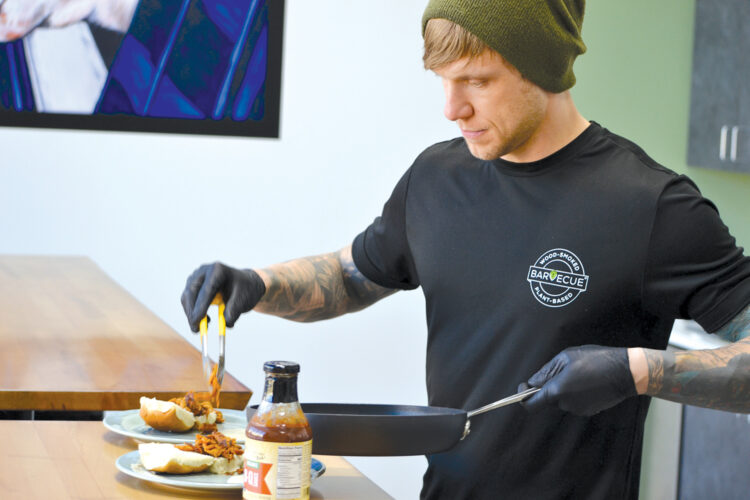
Zack Werner serves a sample of Barvecue carnitas and pulled BVQ | Photos by Jason Benavides
ENTREPENEURS | By TL Bernthal
Dec. 15. Friends who don’t eat meat miss the camaraderie of a shared meal when pulled pork barbecue is served at a party or celebration.
And in the Carolinas, BBQ is served a lot. A solution? Barvecue.
Barvecue is a plant-based smokehouse operation in Cornelius that opened a year ago and caters to vegans, vegetarians and flexitarians. The smokehouse produces three flavors of meat alternatives that can be found in major retailers locally and nationwide and in some restaurants and university kitchens.
“It’s all about trying to build a company that takes care of employees, animals and our planet,” says co-founder Lee Cooper.
The players
Lee Cooper, founder and CEO, sold a successful Cornelius-based industrial valve company in 2017 that he ran for 30 years. Plant-based theories were starting to take off and he added creating a plant-based barbecue brand on his list of possible new ventures because of the impact it might have.
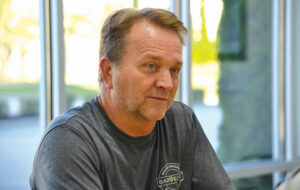
Lee Cooper, founder and CEO of Barvecue.
But it wasn’t at the top of his list until a chance meeting with Andy Masud and Zack Werner, who became co-founders, along with Lee’s wife, Jeni Cooper.
Andy, a special education teacher, was working with the Coopers’ daughter. Andy mentioned to Jeni that her husband, Zack, had a food science and culinary background. Jeni has long desired an end to factory farming.
The two couples got together for dinner and in October 2017 a business was born over black bean burgers.
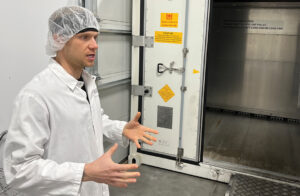
Zack Werner is in charge of the smokehouse production
Lee Cooper says Werner’s enthusiasm convinced him to “do this wild and crazy thing.”
Cooper came up with the name Barvecue, which is now trademarked. “It just sort of came to me, that it was a great name for a plant-based barbecue.”
What’s in it
The base protein of Barvecue is whole soy with North Carolina sweet potatoes, organic apple cider vinegar and a spice blend for each product. The ingredients are wood-smoked with spice blends Werner is responsible for to get the taste and texture of traditional BBQ.
Barvecue is sold in 10-ounce frozen packages in retail stores and online for about $9 in Pulled BVQ and Carnitas style. You can find it locally at Harris Teeter, The Fresh Market, Whole Foods and Lowes, and on menus at Jack’s Corner Tap, Cool Fish and Davidson Ice House.
The Naked BVQ style is smoked and lightly seasoned and sold mostly to food services and restaurants for its versatility, says Kelsey Joseph, director of business development.
Lee, a Charlotte native, says the Pulled BVQ style with a classic Western Carolina sauce is his favorite. Werner favors the Carnitas style. The Coopers of Davidson and Werner and Masud of Concord are vegan.
The taste is so good that some people don’t realize Barvecue is meatless, even when you tell them. Cooper and Werner found that out while testing the product.
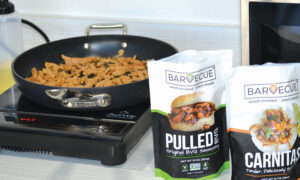
Barvecue is sold in 10-ounce frozen packages in retail stores and online
Werner, who graduated from Michigan State with a degree in food science and studied at the Culinary Institute of Michigan, is in charge of the smokehouse production. The process is cleaner, safer and more efficient than processing meat, although all regulations still apply. The process involves mixing ingredients, smoking trays of the product, quick cooling it, packaging and quick freezing.
Barvecue products are non-GMO project verified, vegan and gluten-free.
The buildup
From the start, the business plan was to build a brand that could go national, Cooper says.
They put together an advisory board that included an executive chef who had worked with the Canadian-based Gardein brand of “meatless meats” and other experts.
Commercial kitchen space is at a premium in this market so the co-founders built their own.
In 2017, Barvecue started research and testing in a 4,000-square-foot facility on Bailey Road. Cooper funded the startup with an investment of a few hundred thousand dollars.
In 2020, Barvecue did a seed round of funding, led by Stray Dog Capital in Kansas, that netted a $2 million investment.
The company started to scale up sales and manufacturing, leased 10,000 square feet at Hyde Park Storage Suites and started construction in January 2021 on the current smokehouse, which opened in October of 2021. Barvecue now sells to 1,200 retailers, Cooper says.
The company employs 12, and is hiring for production shifts. Operating shifts run four days a week and a single shift can produce 800,000 pounds of Barvecue a year.
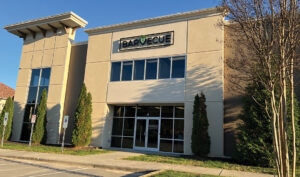
The 10,000-square-foot Barvecue plant has enough capacity for two to three years
What’s next
The 10,000-square-foot plant has enough capacity for two to three years, Joseph says; growing demand could be satisfied by adding additional shifts or expanding into an adjacent building.
For now, the goal is to expand into more markets nationwide, she says. Barvecue is readily available along the East Coast, including the South, and the West Coast, especially in California. The target is for other regional markets in mid-America.
Flexitarians are a big market, Cooper says. They may want to have a meal once or twice a week that centers on a plant-based option for health, environment or animal protection reasons.

Discussion
No comments yet.